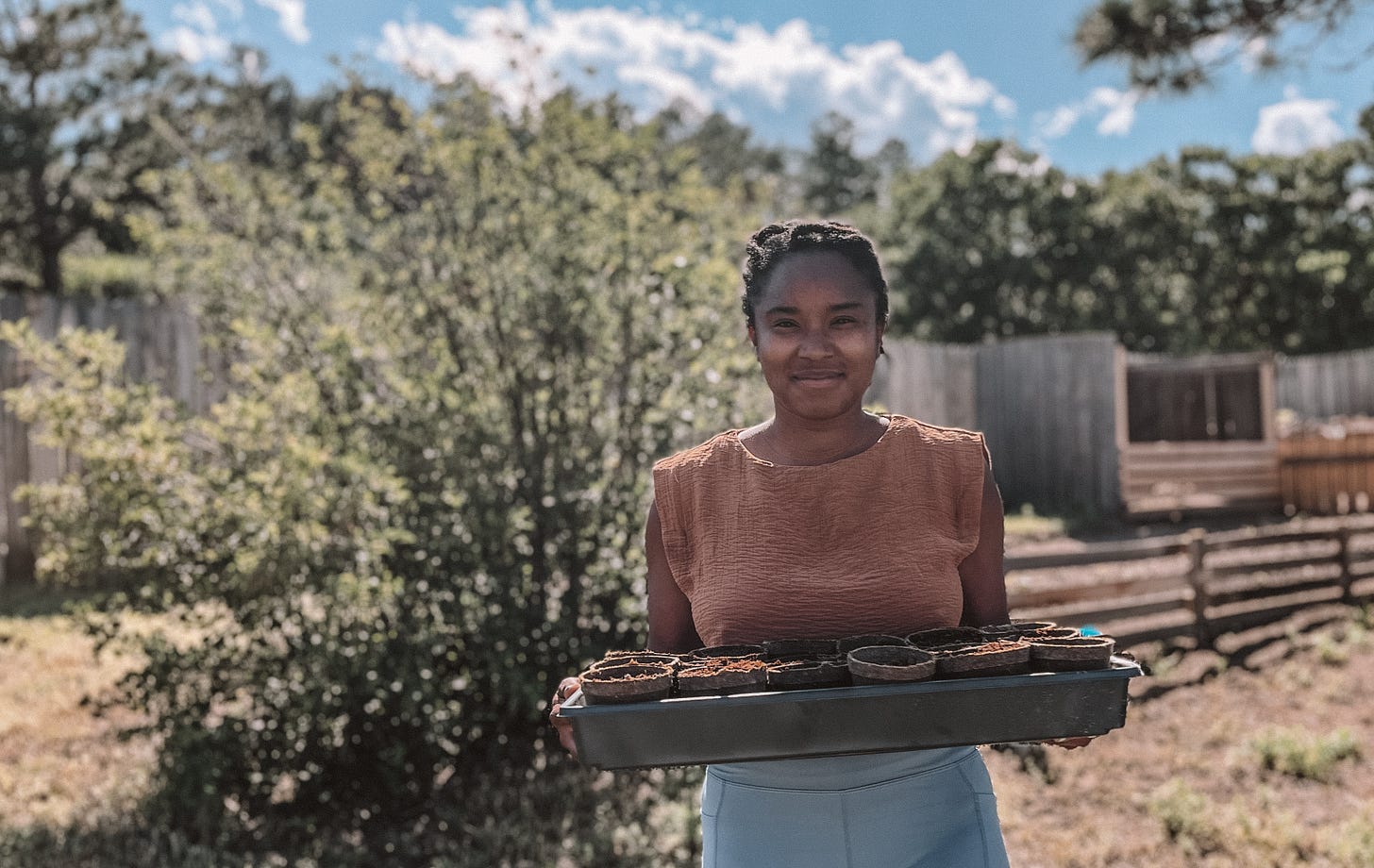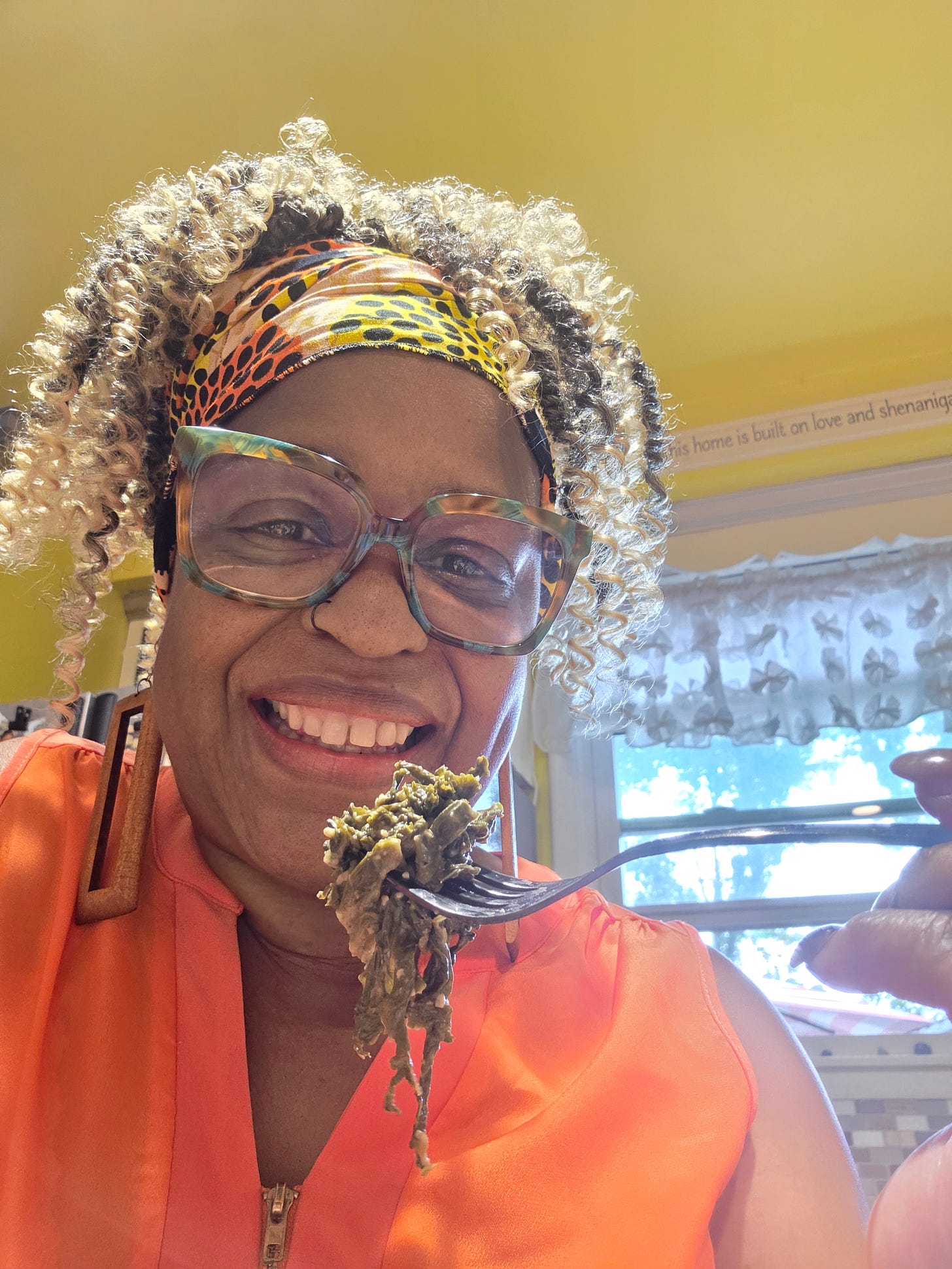The Legacy of Collard Greens: A Juneteenth Reflection on Ancestral Plant Medicine
A conversation with 5th-generation herbalist, Iya Sobande Greer
Hello, beautiful people! I’m honored to share a project I recently worked on through my role as Marketing & Ecological Storyteller with Ecoversity. In reverence of Juneteenth, I had the privilege of sitting down with two Black herbalists whose words felt like a homecoming for me. Through our conversations, I found myself tracing connections between the plants they honored and the foods I grew up eating, but never knew the full stories behind.
Today I’m sharing a conversation that really moved me with Iya Sobande Greer. She’s a fifth-generation herbalist, holistic nutritionist, and Educator at Ecoversity. As a special gift, she also shared a poem inspired by our exchange and recorded it live for your listening experience. I’ve included it below.
I didn’t expect to cry on Zoom.
But when I asked Iya Sobande Greer what plants reminded her of ancestral survival, she didn’t just give me an answer, she gave me a doorway.
“You got collard greens,” she said, like a bell ringing true.
And that opened a door.
She didn’t just talk to me. She took me to a memory.
She brought me into her kitchen.
She reminded me that soul food isn’t just food. It’s a sacred memory of medicine that outlived the ones who first cooked it.
And I felt that in my bones.
In the days leading up to Juneteenth, I thought I was just gathering quotes and reflections to mark the occasion for my company’s blog. But what I received was a kitchen altar, which I’m sharing with you.
What Is Juneteenth?
On June 19, 1865, more than 250,000 enslaved people in Texas were finally told they were free, two years after the Emancipation Proclamation was signed. A day we now honor as Juneteenth.
But the story of freedom didn’t start there.
Long before that day, enslaved Africans braided seeds into their hair as they were forced onto ships across the Atlantic. Seeds they prayed would sustain them. These tiny kernels from their homeland carried the twin promises of nourishment and healing.
The ships stole their names.
Their land was taken.
Their children were sold.
But the seeds endured.
On unfamiliar soil, enslaved people planted what they had carried in hidden garden plots behind slave quarters.
Through the roots they dug, the bark they boiled, and the leaves they brewed into bitter tea, enslaved Africans preserved centuries of healing knowledge.
Today, we honor the survival of both the people and the plants.
And perhaps no plant tells this story more clearly than collard greens.
“How,” Iya Sobande Greer asks, “did these collards make their way from cast iron pots to the finest china this nation could offer. China, we were never allowed to eat from?”
The Lineage of Collard Greens
Collard greens, with their broad, waxy leaves and earthy aroma, are a cornerstone of Southern cuisine. But their roots stretch far beyond the red clay of the American South. Originally cultivated in ancient Greece and Rome, these resilient greens journeyed across oceans, eventually anchoring themselves in the gardens and kitchens of enslaved Africans in the United States.
When the transatlantic slave trade tore families from their homelands, it also severed access to familiar foodways. And yet, enslaved people carried something with them: memory. The collard greens they encountered in the American South bore a striking resemblance to traditional African crops.
In the face of profound deprivation, collard greens became more than food. Simmered low and slow with smoked meats and seasonings, they transformed into sustenance that restored strength and offered a moment of home in a hostile world. Today, collard greens continue to hold court on kitchen tables across the South and beyond. They are grown in backyard beds, served at family reunions, and offered as staples at Sunday dinners. But their true power lies not just in taste, but in testimony.
I invite you to listen.
🎧 Below, you’ll find an audio poem from Iya Sobande Greer, titled
The Collards Remember. This is not just a poem; it is a prayer. A song for the women who rose before dawn, stirred pots with weary hands, and passed down medicine in meals, in memory, in marrow.
As I sit with the meaning of Juneteenth, one question keeps echoing in my heart:
How do we honor the ones who came before us?
Not just in history books, but in the rhythm of our days.
In the food we prepare and the plants we remember.
That’s why I’m so honored to share the voice of Iya Sobande Greer.
If something stirs in you as you read or listen today, I invite you to comment below or reach out to Iya Sobande Greer and let her know how her words moved you.
Instagram:
@iamsobandeg
Website:
https://naturalchoicesbotanica.com/
https://sacredwatersretreat.com/
With love,
Lee
🪴 Until next time, be well.







thanks, I didn't know about the seeds being braided into hair - that's a powerful image. Thanks for sharing.
BTW, we love collard greens but don't have that history or connection you referenced. I remember once Michael cooked and brought some into his lab when we lived in NYC - he was surprised when several ladies commented that they couldn't believe he could cook greens and do it well